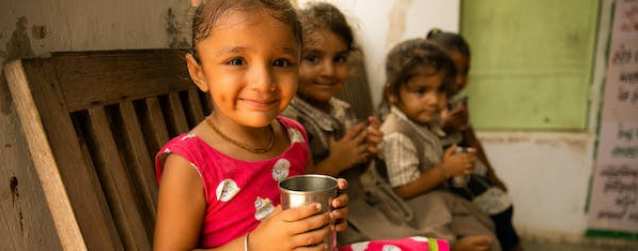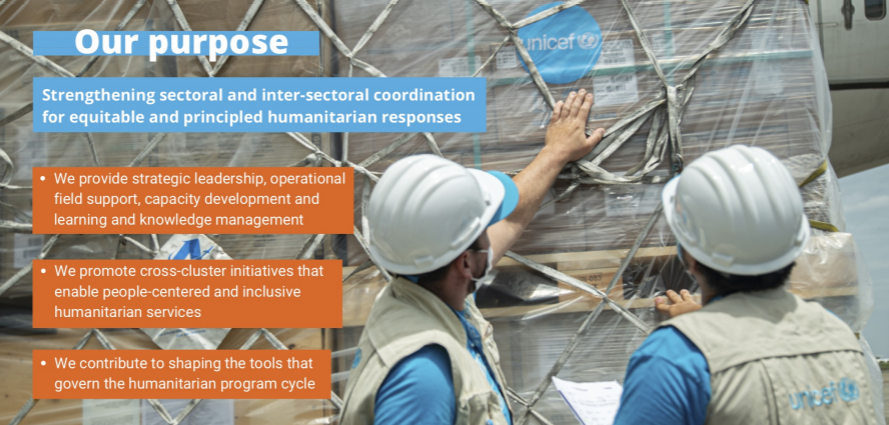A PILOT APPROACH TO STRENGTHENING COORDINATION AND INFORMATION MANAGEMENT AT COUNTRY AND REGIONAL LEVEL
The Global Nutrition Cluster (GNC) aims to strengthen country technical and coordination capacities to prepare for, respond to and recover from nutrition shocks. One example of the GNC’s support to countries includes the in-country or remote deployment of the Rapid Response Team (RRT) where the GNC temporarily deploys nutrition cluster coordinators (NCC) and information management officers (IMO) for up to 8 weeks to a specific country. While successful, the approach was challenged by the increasing need to address multiple country requests for support, often simultaneously.
To meet the high needs with limited capacity, the GNC is piloting a new approach, deploying RRTs to regional offices (RO) for multi-country support. Thus, coordination is strengthened at both country and regional levels for greater coherence, while also improving collaboration with regional management and emergency teams. The pilot approach was launched in July, in the East and Southern Africa Regional Office and the West and Central Africa Regional Office, given their large number of level-2 and level-3 emergencies. This support implements the recommendations of a recent evaluation of UNICEF’s Cluster-Lead Agency Role (CLARE II), calling for strengthened coordination capacities at the regional level.
Currently, 11 countries have received dedicated support through these regional deployments. Given the positive feedback received from all parties, and continued high demand, the pilot will continue until December. The impact from this pilot will be evaluated for the potential conversion into a more permanent arrangement in 2023 and beyond.

DISABILITY INCLUSION IN 2022 HNOs AND HRPs - WHAT CAN WE LEARN FOR 2023?
A review of disability inclusion in 2022 Humanitarian Needs Overviews (HNOs) and Humanitarian Response Plans (HRPs) was recently conducted jointly by WFP, WHO, UNHCR, OCHA, IOM, Global Education Cluster, Humanity & Inclusion, and led by UNICEF, as part of the UK Foreign, Commonwealth and Development Office (FCDO) Humanitarian Single Business Case.
The review highlighted areas where HNOs and HRPs are continuing to show strengthened integration of disability, including:
- A substantial improvement in collection and use of disability data over the past five years. In 2022, all but one HNO presented data on the needs of persons with disabilities
- A shift away from using only blanket statements of vulnerability in HNOs, which do not provide a solid basis for inclusive response planning. In 2022, over 90% of HNOs included analysis of the factors contributing to heightened risk for persons with disabilities
- Mainstreaming of disability across all sectors in HNOs and HRPs, rather than disability being viewed solely as a health or protection issue
The review also highlighted areas where further work is needed:
- Both HNOs and HRPs have limited reflection of disability inclusion in monitoring frameworks, such as specific indicators on disability inclusion or disaggregation by disability
- There is a need to strengthen recognition of local organizations of persons with disabilities as actors in the response, as part of a broader prioritization of localization
- As part of commitments to Accountability to Affected Populations, there is a good opportunity for strengthening description in HRPs of accessible and inclusive feedback and complaints mechanism
The advisory group coordinating this review process, and broader efforts towards strengthening disability inclusion in HNOs/HRPs, has focused for the past years on collection of data on persons with disabilities, including through collaboration with REACH on development of a guidance note on use of Washington Group Questions in MSNAs. Going forward, the group will shift efforts towards supporting the use of data, including to translate needs assessment into inclusive response planning. This work is based on the guidance on disability inclusion in HNOs and HRPs.
GENDER-BASED VIOLENCE HAS LAUNCHED NEW TOOLKITS FOR CLUSTERS
Gender-based violence risk mitigation means ensuring humanitarian service delivery: 1) does not increase the likelihood of GBV occurring; 2) seeks to identify and mitigate GBV risks; and 3) conducts ongoing monitoring of access and barriers to services, particularly those faced by women and girls. One of the key tools that UNICEF developed to identify potential barriers in accessing lifesaving humanitarian services is the Availability, Accessibility, Acceptability and Quality (AAAQ) Framework. To enhance its relevance and usability to education cluster coordinators in identifying and addressing GBV risks in education in emergencies interventions, it has been customized and aligned with the Inter-Agency Network for Education in Emergencies (INEE) Minimum Standards. The next step is to ensure that it informs the needs assessment and analysis package of education coordination mechanisms.
Meanwhile, the GBV in Emergencies team, along with colleagues from the Disabilities team, is working with the Global WASH Cluster to strengthen the disability inclusion elements of the existing WASH Safety Audit Tool. The ultimate aim is to ensure WASH facilities are safe and accessible for all women and girls, including those with disabilities. A joint mission is being planned to support a WASH Cluster coordination mechanism to validate and roll-out the tool.
LEARNING ON COORDINATION MADE EASY
UNICEF is Cluster Lead Agency for Nutrition, WASH, Education (with SCI) and Child Protection. Have you ever thought about working in Cluster Coordination?
After launching its Humanitarian Coordination Learning Channel in March with an initial catalogue of Information Management courses, the Global Cluster Coordination Section (GCCS) is beginning to make available online training on Cluster Coordination with support from BHA. As with Information Management, there are core modules rather than sectoral, and offer useful skills beyond the cluster roles. Intended to support anyone, anywhere wanting to learn more about humanitarian action, these courses were made openly available through UNICEF’s Agora platform in English, Spanish and French. In only three months, the new coordination courses were already completed by 248 people, highlighting the need for such capacity building material. The IM courses have been very well received as well, having registered 2,650 module completions since they were launched eight months ago. This combined offer now allows the channel to deliver up-to-date and certifying training to both staff members and partners all over the world. See for yourself, click here to enroll today and skill up!

For additional information on the work of each cluster/area of responsibility please click on the images below.
We would welcome your feedback on our newsletter!
Please share your thoughts with us.
If you encounter any issues while opening links, please contact us
Copyright © Global Cluster Coordination Section, All rights reserved.